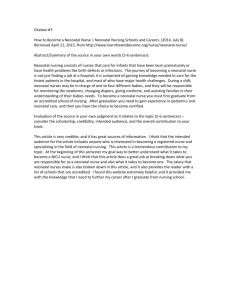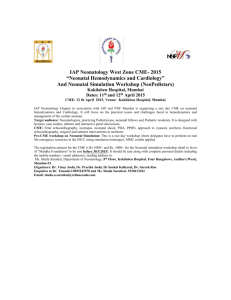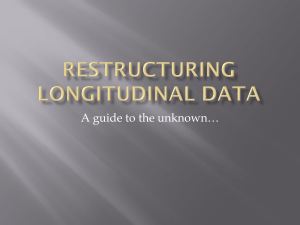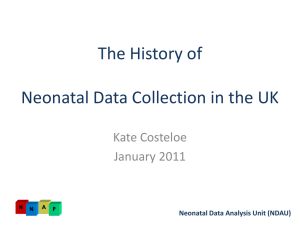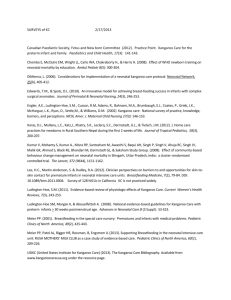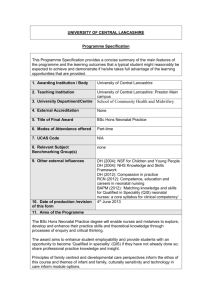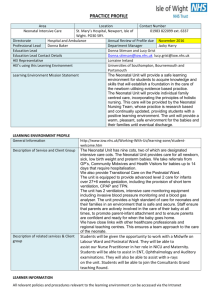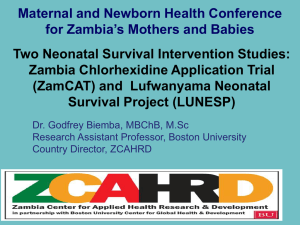module details
advertisement
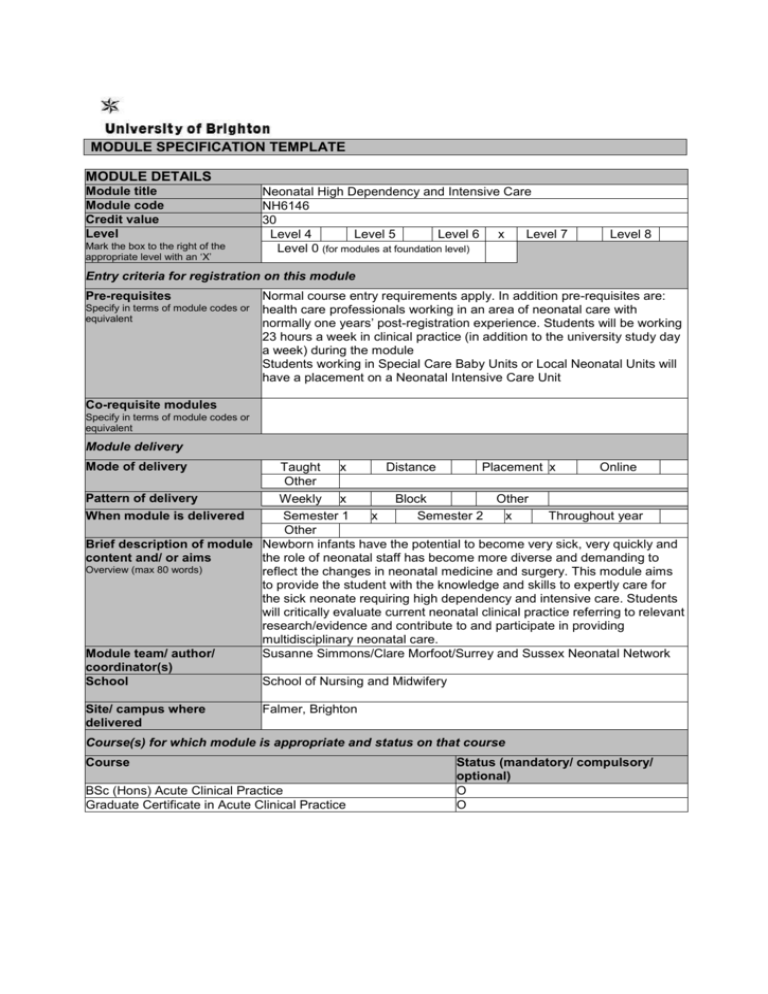
MODULE SPECIFICATION TEMPLATE MODULE DETAILS Module title Module code Credit value Level Mark the box to the right of the appropriate level with an ‘X’ Neonatal High Dependency and Intensive Care NH6146 30 Level 4 Level 5 Level 6 x Level 7 Level 0 (for modules at foundation level) Level 8 Entry criteria for registration on this module Pre-requisites Specify in terms of module codes or equivalent Normal course entry requirements apply. In addition pre-requisites are: health care professionals working in an area of neonatal care with normally one years’ post-registration experience. Students will be working 23 hours a week in clinical practice (in addition to the university study day a week) during the module Students working in Special Care Baby Units or Local Neonatal Units will have a placement on a Neonatal Intensive Care Unit Co-requisite modules Specify in terms of module codes or equivalent Module delivery Mode of delivery Taught x Distance Placement x Online Other Pattern of delivery Weekly x Block Other When module is delivered Semester 1 x Semester 2 x Throughout year Other Brief description of module Newborn infants have the potential to become very sick, very quickly and content and/ or aims the role of neonatal staff has become more diverse and demanding to Overview (max 80 words) reflect the changes in neonatal medicine and surgery. This module aims to provide the student with the knowledge and skills to expertly care for the sick neonate requiring high dependency and intensive care. Students will critically evaluate current neonatal clinical practice referring to relevant research/evidence and contribute to and participate in providing multidisciplinary neonatal care. Module team/ author/ Susanne Simmons/Clare Morfoot/Surrey and Sussex Neonatal Network coordinator(s) School School of Nursing and Midwifery Site/ campus where delivered Falmer, Brighton Course(s) for which module is appropriate and status on that course Course BSc (Hons) Acute Clinical Practice Graduate Certificate in Acute Clinical Practice Status (mandatory/ compulsory/ optional) O O MODULE AIMS, ASSESSMENT AND SUPPORT Aims This module aims to develop and enhance the knowledge, understanding and practice skills of students in promoting the delivery of high quality evidence-based care for neonates requiring high dependency and intensive care. Learning outcomes On successful completion of the module the student will be able to: 1 Critically evaluate neonatal high dependency and intensive care provision with reference to current research/evidence 2 3 4 5 Content Learning support Formulate a critical understanding of the pathophysiology of neonatal conditions requiring high dependency and intensive care Complete clinical practice experience in a Neonatal Intensive Care Unit Proficiently deliver evidence-based practice in the care of the high dependency and intensive care neonate and his/her family Appraise the resource and management issues involved in neonatal care delivery at local and national level Genetics, embryology, foetal circulation and transition to exutero life Pathophysiology of neonatal conditions and clinical management: renal, cardiac, respiratory, neurology, metabolic, surgery Neonatal services and care provision: policy, neonatal Networks, neonatal transfer Long term implications of prematurity: parent’s perspective, audiology, ophthalmology, withdrawing/withholding treatment Textbooks Latest editions of the following texts: Boxwell, G. (ed). 2010. Neonatal Intensive Care Nursing. 2nd edition. London. Routledge Cloherty,J., E.Eichenwald and A.Stark. 2011. Manual of Neonatal Care.7th edition. London. Lippincott Williams and Wilkins Meeks,M. and H.Yeo. 2012. Nursing the Neonate. Chichester:WileyBlackwell Merenstein, G.B and S.L. Gardner. 2011. Merenstein and Gardner’s handbook of neonatal intensive care. 7th edition. London. Elsevier Health Sciences Sinha,S., L.Miall and L.Jardine. 2012. Essential Neonatal Medicine. 5th edition. Chichester: Wiley-Blackwell Moore, K.L. and P.V.N. Persaud. 2008. The Developing Human: Clinically Oriented Embryology. 8th ed. Philadelphia: Saunders Journals Archives of Diseases in Childhood – Foetal editions Journal of Neonatal Nursing Infant Websites http://www.bliss.org.uk http://www.neonatology.org http://www.npeu-ox.ac.uk Teaching and learning activities Details of teaching and learning activities Teaching and learning strategies include: Case study/problem based learning Lectures by university lecturers and clinical specialists in practice Discussion Group work Quizzes Reflection Allocation of study hours (indicative) Study hours Where 10 credits = 100 learning hours SCHEDULED This is an indication of the number of hours students can expect to spend in scheduled teaching activities including lectures, seminars, tutorials, project supervision, demonstrations, practical classes and workshops, supervised time in workshops/ studios, fieldwork, external visits, and work-based learning. 72 hours taught 18 hours protected clinical practice GUIDED INDEPENDENT STUDY All students are expected to undertake guided independent study which includes wider reading/ practice, follow-up work, the completion of assessment tasks, and revisions. 105 hours independent study PLACEMENT The placement is a specific type of learning away from the University that is not work-based learning or a year abroad. 105 clinical skills TOTAL STUDY HOURS 300 hours Assessment tasks Details of assessment for this module Students will undertake two assessment tasks: both assessment tasks must be passed in order to pass the module overall. Part one Theory 50% Students will present a 3000 word assignment which will critically evaluate the impact on the infant, family and neonatal services of one aspect of neonatal care provision. The topic chosen will be negotiated with the module leader (LO1, LO2, LO5) Part two Practice 50% 6 skills - 40% students will be expected to complete 6 skills which assess their knowledge and critical application to clinical practice (LO2, LO3, LO4) 1 Clinical Link Learning Activity (CLLA) (10%) – critically explore the pre and post operative care of a neonate requiring surgery. (LO2, LO4) The clinical link learning activity asks the student to identify the key principles involved in neonatal surgery. Students choose one surgical condition that either interests them or that they have had experience of and present the specific care that the neonate requires. The activity has a word limit of no more than 500 words and should be supported by key references. Types of assessment task1 % weighting Indicative list of summative assessment tasks which lead to the award of credit or which are required for progression. (or indicate if component is pass/fail) WRITTEN COURSEWORK 3000 word written assignment 50% PRACTICAL Clinical Skills Assessment – 6 skills Clinical Link Learning Activity 40% 10% EXAMINATION INFORMATION Area examination board Undergraduate CPE (Acute Clinical Practice) AEB Refer to Faculty Office for guidance in completing the following sections External examiners Name Position and institution Date appointed Karen Currell Senior lecturer University of Huddersfield September 2013 Date tenure ends August 2017 QUALITY ASSURANCE Date of first approval June 2008 Only complete where this is not the first version Date of last revision May 2010 Only complete where this is not the first version Date of approval for this version Version number Modules replaced June 2013 3 (old code NH3146) Specify codes of modules for which this is a replacement Available as free-standing module? 1 Yes No Set exercises, which assess the application of knowledge or analytical, problem-solving or evaluative skills, are included under the type of assessment most appropriate to the particular task. x
